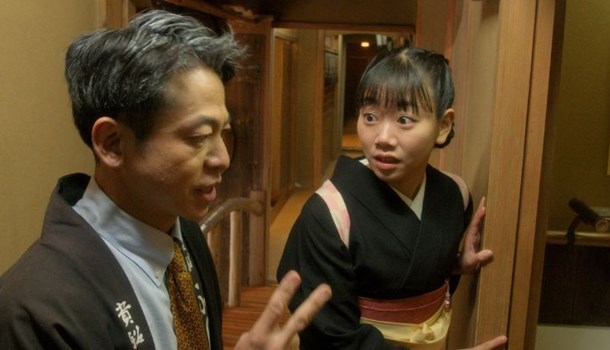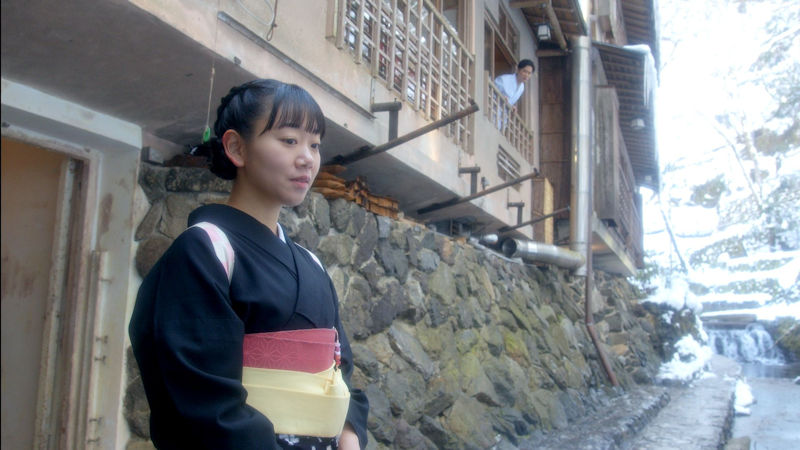
Written by Richard Durrance on 14 Feb 2024
Distributor Third Window • Certificate 12 • Price £17.99
Director Junta Yamaguchi's 2020 film Beyond the Infinite Two Minutes beguiled many, being a low-key, low-cost, high-concept comedy that punched far above its weight. As people then started to see early screenings his follow-up film, another time-funked narrative, River (2023), good things started to again be written about it, words that it matched its predecessor.
Would it? Let's see.
Winter, a small rural inn hosting a few guests is settling in for a cold day. Lunch is finished, the staff are either taking a rest or continuing to serve their clientele. Mikoto (Riko Fujitani) stands beside the river that washes past the pastoral inn, then steps back inside to help her colleague clean up one of the rooms. Suddenly, she is back at the side of the river, just like time has restarted. Is time looping? Everyone remembers what has passed before, and soon everyone, guests included, realise that they are stuck in a two-minute loop of time, each loop returning them to their starting position. How did this happen? How can they stop this? And how will everyone react to this looping?
We’re on familiar ground to parts of Beyond the Infinite Two Minutes but don’t mistake River for a retread of Yamaguchi’s previous film. River is arguably a more intricate film at times, and also has some aspects that may exist only in my head (but if so that’s a sign of a good narrative) – considering we’re located in a small rural inn during winter, once our protagonists start to time loop, the staff we first meet continue to see to their work despite their confusion, spending their two-minutes politely seeing to the equally bemused guests. As people begin to demand answers the staff have no reason to know answers to, I felt there was satire going on regarding service culture. When all goes pear-shaped those in service industries are expected to have all the answers, and carry-on carrying-on, at least for a while.
Then the film settles down, allowing its narrative to unfold, the characters taking centre stage, whether the staff, the creatively-blocked writer and agent who is constantly sent back to the baths, or the old friends drinking and eating rice and eating rice and eating rice. These individual stories, often comic, sometimes taking temporarily dark turns all fit snugly together as with each time loop we are returned to Mikoto standing beside the river.
Like Beyond the Infinite Two-Minutes, the film is suffused with a warm humour and a nuanced eye for human behaviour. Using much of the same cast, you ultimately feel very at home with the characters and the actors, even if occasionally the cast can be a little theatrical (though it mostly fits the film). That said, I felt Mikoto was pleasingly underplayed and represented by Fujitani with extreme charm, and being the centre of the film’s action helps keep the movie going because otherwise, narratively, River really needs to run to keep up with itself because of the need for every two-minute loop to move the story on, yet to be the same but different. Mostly, the story shifts quietly with each loop, sometimes bringing in a surprise but often gradually adjusting itself, like watching colours slowly change so that where once it may be one thing it's another, organically changing. Arguably towards the hour mark, and being a 85-minute film, River does threaten briefly to run out of creative steam, and a certain lull is almost inescapable, because the need for continuous invention is hard to maintain consistently throughout. Mainly though, River does maintain its invention. Often it brings the story back to life by recognising some unseen emotional relationships that ensures the narrative two-minute trick never just becomes a gimmick.
Arguably one of River’s great assets is its use of the inn itself. Though the film only covers a small area (how can it not with each loop being two-minutes?), how director Yamaguchi, and screenwriter Makoto Ueda, use space is often superb. The inn is full of small tunnels and areas that are used inventively throughout, both giving a sense of a living, breathing place but also using its deceptively labyrinthine area to allow sudden revelations. It’s quietly done, and easy to miss but how the location is used is as important as any other aspect of the film, if not more so and it’s done with such effortlessness that you realise there was likely painstaking planning behind it, as most apparently effortless aspects of art are.
I do wonder is the denouement of the film may divide some, as though the film does presage it a bit, it could be seen as a bit too pat at ending, though it fits tonally with the feature.
With Beyond the Infinite Two-Minutes and River, Yamaguchi explores time and relationships differently, but with near equal charm. I’d like to see him try his hand at something else though, it’s hard to see where he can take time travel in his context much further. Then again maybe he can?
Once again Yamaguchi shows in River how much you can do with a simple idea, well written and carefully realised, without the need for special effects or other bells and whistles, and that he is unafraid to add a little darkness amongst the light.
Your two minutes are up, back to Mikoto at the river again.

Long-time anime dilettante and general lover of cinema. Obsessive re-watcher of 'stuff'. Has issues with dubs. Will go off on tangents about other things that no one else cares about but is sadly passionate about. (Also, parentheses come as standard.) Looks curiously like Jo Shishido, hamster cheeks and all.
posted by Richard Durrance on 17 Dec 2025
posted by Richard Durrance on 12 Dec 2025
posted by Ross Locksley on 09 Dec 2025
posted by Richard Durrance on 28 Nov 2025
posted by Richard Durrance on 25 Nov 2025
posted by Richard Durrance on 18 Nov 2025
posted by Richard Durrance on 14 Nov 2025
posted by Richard Durrance on 11 Nov 2025